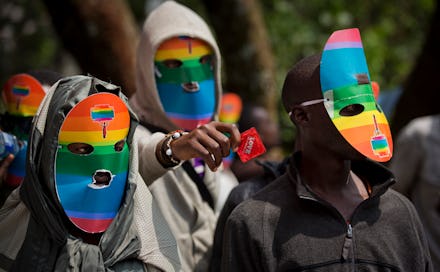What American Evangelists Have to Do With Uganda's Terrible Anti-Gay Laws

Endangering hundreds of LGBT people and gay-rights activists, an Ugandan tabloid newspaper has issued a list of Uganda's "Top 200 Homosexuals," taking full advantage of the country's new anti-gay law.
Uganda's anti-gay law, enacted Monday by President Yoweri Museveni, may not be simply an Ugandan problem; it may very well be an American problem, too. Uganda has always been conservative when it comes to protecting tradition and family structures, as well as hostile to LGBT people. But pointing fingers at far-off countries that are less "developed" than the U.S. is just too simple in this situation. Rising evidence suggests that the American export of extreme evangelist beliefs may have tipped the scale in Uganda towards violence and against equality.
The anti-gay law originally called for the execution of homosexuals, a measure radical evangelists and even U.S. Congressman James Inofe (R-Okla.) supported. Leading missionary groups, Inofe allegedly flew to Uganda on American tax dollars. After international outrage, the anti-gay bill's legislators deleted the clause calling for the death penalty, swapping it instead for years behind bars.
If found guilty of acts of "aggravated homosexuality," a person will face life in prison. Under the law, those who don't report homosexuality, or who become implicitly involved (by owning property where homosexual acts have taken place) are also justifiable criminals. De facto, Uganda's anti-gay law will mean an increase in violence against LGBT individuals and those suspected to be.
Anti-gay propaganda has also affected health care in the country. Local HIV campaigns, influenced by evangelical groups, have deliberately avoided outreach and treatment for gay individuals.
The anti-gay bill was originally put forth by Ndorwa West MP, David Bahati in 2009. Bahati reportedly met with American anti-gay activist Scott Lively before the bill's creation. Lively is an anti-gay activist and author from Oregon who claims in his book that being gay and Nazism are linked.
According to NBC, Lively attended a 2009 conference in Uganda where he called the gay rights movement an "evil institution [whose] goal is to defeat the marriage-based society and replace it with a culture of sexual promiscuity."
Trying to save face, Lively came out today against the anti-gay law in Uganda, calling it too severe.
Homophobia in Uganda has sparked outrage from many in the religious community, complicating simple demarcations on the issue — like religion versus progress or Americans versus gay Ugandans. In 2012, 46 American leaders published an open letter supporting LGBT rights in Uganda. Retired Anglican bishop Desmond Tutu has responded to anti-gay activism in Uganda, saying, "I would refuse to go to a homophobic heaven ... I would much rather go to the other place."
One thing is clear — the ties between radical U.S.-based religious groups and Uganda's anti-gay law are too close to reasonably distinguish them as mutually exclusive.
Upon the law's passage, the U.S. government announced it will review its relations with Uganda. Perhaps it also needs to review the role of radical religious groups working on its territory and in its Congress.